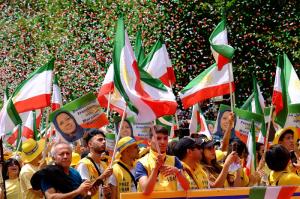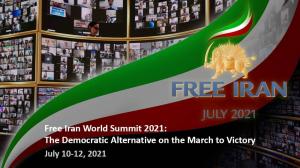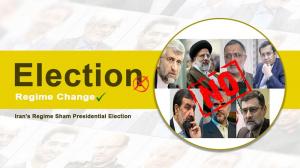The summit will show how Iranian activists and the international community can push the Iranian regime closer to the brink of overthrow.
— NCRI
PARIS, FRANCE, June 6, 2021 /EINPresswire.com/ — In July, the Iranian communities outside of Iran will hold their annual rally of Iranian expatriates and political supporters from throughout the world. It will be, among other things, a prime outlet for international discussion regarding the implications of the Iranian regime’s sham presidential election. That election is set to take place on June 18, but the voting is expected to be a mere formality, with Judiciary Chief Ebrahim Raisi being the pre-selected victor in a tightly controlled political process.
In a press conference last week, NCRI Foreign Affairs Committee Chairman Mohammad Mohaddessin described Iranian elections in general as “a travesty [and] a selection process by a supreme leader who is himself unelected.” He then went on to explain that the forthcoming presidential election is even less free than others, on account of Supreme Leader Ali Khamenei attempting to consolidate power in the midst of escalating challenges to his regime’s hold on power.
The July rally will catalog those challenges and also outline some of the ways in which Iranian activists and the international community can push the Iranian regime closer to the brink of regime change. Mohaddessin’s press conference provided a sort of preview to those recommendations, in that he concluded his remarks by urging Western leaders to adopt policies that hold Iranian officials accountable for crimes and malign activities, thereby ending a culture of impunity that has persisted in Tehran for much of the four-decade history of the Iranian regime.
The NCRI Foreign Affairs Committee chairman also suggested that even before such comprehensive action is taken, the international community can strike a blow against Iranian impunity by closing ranks with the Iranian people to “condemn this sham election as illegitimate, neither fair nor free.” That sentiment is poised for expression in the form of an electoral boycott which the NCRI and its leading constituent group the People’s Mojahedin Organization of Iran (PMOI/MEK) have been promoting for months, with clear signs of success at every stage.
Popular embrace of the boycott movement appeared likely from the outset because the majority of Iran’s population had already embraced a similar movement in February 2020, at the time of Iran’s parliamentary elections. Even the regime’s official statistics and state media outlets acknowledged that the turnout in that election was a record low. Some have since predicted that that record will be broken this month, on account authorities have largely refused to acknowledge the grievances underlying the previous boycott.
Many of those grievances are extremely longstanding and have been articulated by the NCRI at every international gathering dating back more than 15 years. But even the Iranian regime’s most familiar problems have grown worse in recent years, to the point at which the economy is on the verge of collapse, the country is uniquely isolated, and domestic unrest has achieved an unprecedented scale. All of these trends were explicitly highlighted by Mohaddessin last week, as evidence that this year’s election is different from its predecessors and indicative of a growing sense of desperation among the establishment in Tehran.
Those same trends will surely be underscored for a much larger international audience in July. By that time, the electoral boycott will have demonstrated that inside Iran there is still a great deal of commitment to the anti-government sentiment that was expressed through three nationwide uprisings between January 2018 and January 2020.
The largest of these, in November 2019, saw slogans like “death to the dictator” being chanted simultaneously in nearly 200 cities and towns. The clear expression of nationwide support for regime change prompted authorities to open fire on the crowds, killing approximately 1,500 people in a matter of days. But even this display of unmitigated brutality did not prevent the further expression of dissent, and activist groups were back out in the streets just two months later, openly confronting the very same repressive institutions that had killed so many of their countrymen.
An electoral boycott may seem like a comparatively modest approach to expressing distaste for the ruling system, but it is due to take place in spite of repeated warnings from Iranian officials that voting is a patriotic and even a religious duty. Resistance activists have conveyed exactly the opposite sentiment via public demonstrations and messages posted in public spaces, often accompanied by images of Massoud Rajavi, the leader of Iranian resistance and, Maryam Rajavi, the President-elect of the National Council of Resistance of Iran (NCRI).
Mrs. Rajavi has already articulated a clear pathway to democracy for the Iranian people. This has been outlined in a 10-point plan for the country’s future, which has received considerable support from Western policymakers over the years, often expressed through their own speeches at NCRI rallies and events.
The selection of Raisi as a mass murderer for the president is the final straw, and it’s time to stop the appeasement. Raisi’s pending installation as president is a testament to the tight control that the supreme leader exerts over Iranian elections through his virtually unlimited constitutional powers. Meanwhile, the pending electoral boycott is a testament to the fact that the overwhelming majority of the Iranian people recognize this situation and reject the entire system because of its crimes.
In promoting the electoral boycott, MEK’s “Resistance Units” have allowed no ambiguity about the rationale behind it. Their public messages, appearing in more than 250 localities during the month of April alone, have urged people to sit out the election in order to “vote for regime change.” If the public embraces this call to action as they are expected to, there is little doubt that historic non-participation in the presidential election will be a precursor to a renewal of the sort of unrest seen in November 2019.
In fact, Mohammad Mohaddessin used last week’s press conference to predict that “the looming nationwide uprisings… will be far more intense and widespread than in previous years.” If there are signs of those uprisings in the immediate aftermath of the election, they will surely be presented to an international audience at the July rally.
Past such rallies have even featured recorded messages from activists inside Iran, who risk their lives by expressing support for a pro-democracy movement that Ebrahim Raisi himself tried to destroy in 1988 when he was a chief architect of that year’s massacre of 30,000 political prisoners, mostly MEK members and supporters.
Western powers should support the Resistance and hold Raisi and others accountable for their crimes against humanity, and stand on the right side of history and with the Iranian people in their quest for freedom.
Shahin Gobadi
NCRI
+33 6 50 11 98 48
email us here
Visit us on social media:
Facebook
Twitter
Free Iran World Summit 2021: The Democratic Alternative on the March to Victory
![]()

























